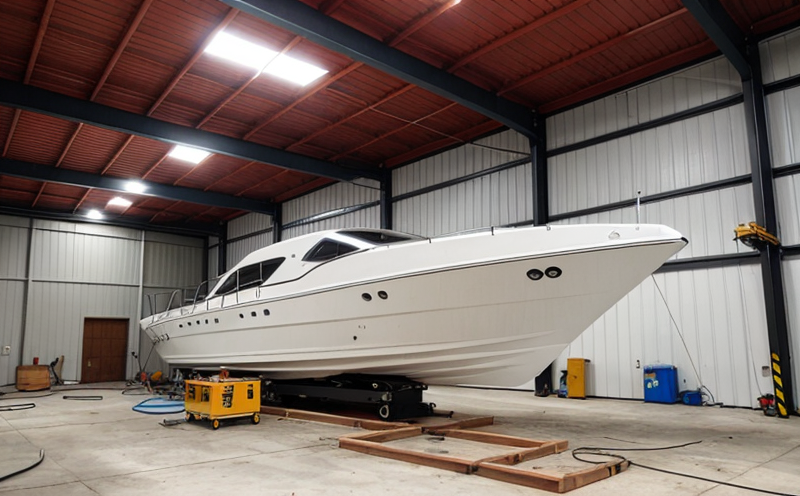ISO 6892 Tensile Testing of Marine-Grade Alloys
In the realm of marine and ship equipment testing, ensuring the integrity and durability of materials is paramount. This is particularly true for marine-grade alloys, which are subjected to harsh environmental conditions that can lead to accelerated degradation over time. The ISO 6892 standard provides a robust framework for conducting tensile tests on these materials, allowing manufacturers and quality assurance teams to verify the mechanical properties of their products.
The tensile test is one of the most fundamental methods used in material testing. It measures how a material behaves under increasing stress until it fractures. For marine-grade alloys, this test is crucial as it helps identify the upper limits of strength and ductility, which are critical for ensuring that materials can withstand the rigors of ocean environments.
The process involves several key steps: selecting appropriate specimens from the batch being tested, preparing these specimens according to specific dimensions outlined in ISO 6892, applying a controlled load until failure occurs, recording the stress-strain behavior during this process, and finally analyzing the results. By adhering strictly to the standards set forth by ISO 6892, laboratories can ensure that their tests are both consistent and repeatable.
One of the primary challenges in testing marine-grade alloys is ensuring that the specimens accurately represent the material they are meant to test. This requires careful selection from batches during production, followed by precise preparation methods that eliminate any potential flaws or inconsistencies. Once prepared, each specimen must be tested under controlled conditions using specialized equipment designed for this purpose.
The results of a tensile test provide valuable insights into not only the strength but also the ductility of marine-grade alloys. These properties are essential when designing and manufacturing components used in ships where safety is paramount. Understanding these characteristics helps engineers make informed decisions about material selection, thereby enhancing overall product performance and reliability.
Furthermore, compliance with ISO 6892 standards ensures that manufacturers meet regulatory requirements globally while maintaining high-quality standards locally. This is especially important for companies operating within the maritime industry where stringent regulations govern everything from design to manufacturing processes.
In summary, conducting an accurate tensile test according to ISO 6892 not only provides critical information about a material's structural integrity but also demonstrates adherence to international best practices that are vital in ensuring safety and reliability across various applications within the marine sector.
Scope and Methodology
| Description | Details |
|---|---|
| Sample Preparation | The ISO 6892 standard specifies exact dimensions for tensile specimens, ensuring consistency across tests. |
| Loading Rate | A controlled rate of loading is applied to simulate real-world stress conditions experienced by marine-grade alloys. |
| Environment Control | The test environment must maintain precise temperature and humidity levels as per ISO 6892 guidelines. |
| Data Recording | All relevant data points are captured throughout the testing process to ensure thorough documentation. |
| Analytical Techniques | Advanced analytical techniques may be employed for more detailed analysis post-test. |
The scope of this service includes compliance with ISO 6892 standards, ensuring that all aspects of the tensile testing process adhere to internationally recognized best practices. This approach guarantees accurate and reliable results, which are essential for making informed decisions regarding material selection and design.
Why Choose This Test
The ISO 6892 tensile test offers numerous advantages that make it an indispensable tool in the assessment of marine-grade alloys. First and foremost, this standard provides a universally accepted method for evaluating materials' mechanical properties, allowing manufacturers to compare their products against industry benchmarks.
It ensures consistent results across different laboratories worldwide, fostering trust among stakeholders involved in global supply chains.
The detailed guidelines provided by ISO 6892 help eliminate ambiguity and ensure that all tests follow a standardized procedure.
This level of precision is particularly important when dealing with materials intended for use in critical applications such as shipbuilding, where even minor deviations could have significant implications for safety and performance.
By choosing this test, customers benefit from enhanced credibility and transparency, which are crucial factors in today's competitive market. Compliance with ISO 6892 also opens up opportunities for international collaboration and trade, as it aligns with global standards recognized by regulatory bodies worldwide.
Environmental and Sustainability Contributions
The accurate identification of material properties through tensile testing helps minimize waste by ensuring that only suitable materials are used in manufacturing processes.
By identifying weak points early on, this test allows for continuous improvement in product design, leading to more efficient and durable products.
The use of advanced analytical techniques post-test contributes to the development of greener manufacturing practices by promoting recycling and reducing resource consumption.
Furthermore, adhering to ISO 6892 standards demonstrates a commitment to sustainable business practices, which is increasingly valued by consumers and investors alike. This approach not only supports environmental stewardship but also contributes positively to the reputation of organizations committed to long-term sustainability goals.





